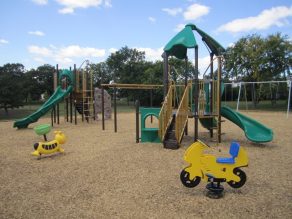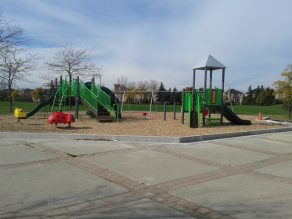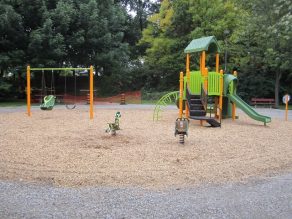Overview
The Playground Program in Community Services maintains standards and practices for the City’s public playgrounds.
We are committed to ongoing monitoring of existing playgrounds and continual research of the playground industry to establish best practices for accessibility. Minor accessibility improvements to existing playgrounds can be made on request.
In the Playground Redevelopment Program accessibility improvements are made when the playground comes up for replacement.
We hope these play features will let more children have fun and memorable playground experiences in our public parks.



Progress
To date the City, universal swing seats have been installed in close to 106 out of 263 playgrounds.
Currently we have six barrier-free playgrounds with rubber surfacing:
- Zonta Meadows Park (2001) – City Centre
- Port Credit Memorial Park (2006) – Waterfront
- O’Connor Park (2011) – Churchill Meadows
- Paul Coffey Castle Playground (2018) – Malton
- Jaycee Park (2018) – East End (Applewood)
- River Grove Community Centre (2018) – North End (East Credit)
One more barrier-free playground is in the capital budget forecast for future development:
- Elmcreek Park (forecast date: 2021) – Malton
Details
To improve accessibility in community playgrounds in line with the Provincial Integrated Accessibility Standards [Ontario Regulation 191/11], some of the changes we are making include:
- Accessible swing seat
- Transfer platform (to improve access to the elevated deck for ages 5-12)
- Spring toy with a backrest
- Turning bar (for ages 2-5 will use in various ways)
- Ground-level play components such as:
- Crawl tube with handholds
- counter
- Tactile / sensory elements
- The above variety depends on the play equipment company
- Paved access route
- Sand pit (for play value)
- Park benches with armrests and on concrete pads with space for a person using a wheelchair
Rubber surfacing
As part of the new standard for improving playground accessibility in community parks, we use playground mulch (engineered wood fibre) for safety surfacing. Rubber surfacing is used in designated destination playgrounds due to its short life cycle.
Wheelchair ramps
Transfer platforms and a variety of ground-level play experiences are provided in community parks. Ramp systems allow for children using wheelchairs access to elevated play structure decks. These are only available in some destination parks due to space requirements or limited play opportunities.
Vendors
Pre-qualified product lines (up to 2020) for play value, variety, durability based on field inspections.
- One play structure with deck designed for ages 18 months to 5 years (including slide, stairs, panel toys and other play elements)
- One play structure designed for ages 5 years to 12 years (including slide, climbers, monkey bars, transfer deck for children with disabilities and other play elements)
- Two belt swings
- Two tot swings
- One accessible swing
- Two spring toys
- Other accessible ground-level play elements
Background
For life cycle replacement, we rank and prioritize playgrounds by structural condition and other factors, with a life span of typically 20-25 years before a playground is replaced.
Staff have field tested destination accessible playgrounds throughout the region and have adopted the best play features, where possible, to community playgrounds within existing budgets.
The City’s approach to large fully accessible, barrier-free playgrounds with rubber surfacing is to provide one in each of the six Service Areas, ideally at a city-wide destination park (with parking, shade, pathway lighting, and ideally a washroom).These barrier-free playgrounds complement the Playground Program, which focuses on the 240+ playgrounds in community parks.
The Playground Design Standard is reviewed every 4-5 years to align with:
- Current CSA Standards, including Annex H of CSA Z614 (Children’s play spaces and equipment that are accessible to persons with disabilities)
- Parks Operations maintenance standards
- Industry trends
- Informal feedback from Councillors and the public